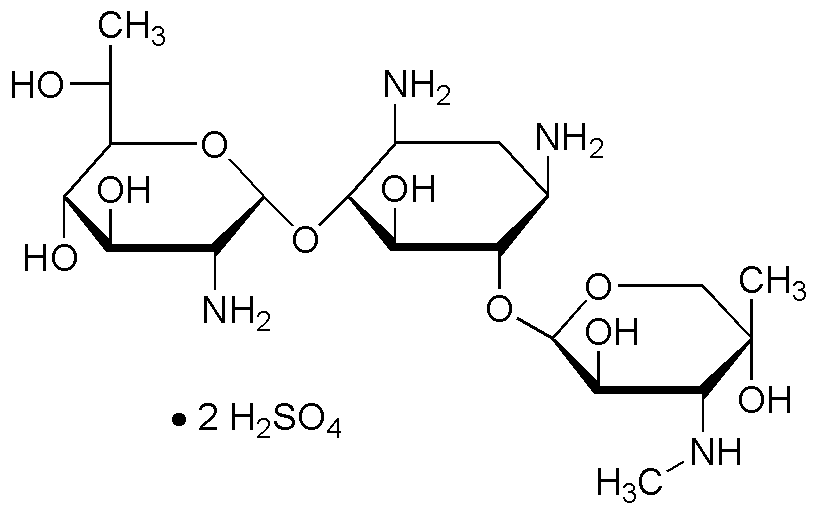Geneticin disulfate salt is widely utilized in research focused on:
- Cell Culture: This compound is commonly used as a selective antibiotic in cell culture systems, particularly for the selection of genetically modified cells that express resistance genes. This is crucial for researchers developing transgenic models.
- Gene Therapy: In gene therapy applications, it helps in the selection of successfully transfected cells, ensuring that only those with the desired genetic modifications are propagated. This enhances the efficiency of therapeutic approaches.
- Pharmaceutical Development: It plays a role in the development of new drugs by providing a means to study the effects of gene modifications on drug responses, thereby aiding in personalized medicine initiatives.
- Biotechnology Research: Geneticin disulfate salt is essential in the biotechnology sector for creating stable cell lines that produce recombinant proteins, which are vital for vaccine production and therapeutic proteins.
- Functional Genomics: Researchers utilize this compound in functional genomics studies to investigate gene function and interaction, allowing for a deeper understanding of cellular processes and disease mechanisms.
General Information
Properties
Safety and Regulations
Applications
Geneticin disulfate salt is widely utilized in research focused on:
- Cell Culture: This compound is commonly used as a selective antibiotic in cell culture systems, particularly for the selection of genetically modified cells that express resistance genes. This is crucial for researchers developing transgenic models.
- Gene Therapy: In gene therapy applications, it helps in the selection of successfully transfected cells, ensuring that only those with the desired genetic modifications are propagated. This enhances the efficiency of therapeutic approaches.
- Pharmaceutical Development: It plays a role in the development of new drugs by providing a means to study the effects of gene modifications on drug responses, thereby aiding in personalized medicine initiatives.
- Biotechnology Research: Geneticin disulfate salt is essential in the biotechnology sector for creating stable cell lines that produce recombinant proteins, which are vital for vaccine production and therapeutic proteins.
- Functional Genomics: Researchers utilize this compound in functional genomics studies to investigate gene function and interaction, allowing for a deeper understanding of cellular processes and disease mechanisms.
Documents
Safety Data Sheets (SDS)
The SDS provides comprehensive safety information on handling, storage, and disposal of the product.
Product Specification (PS)
The PS provides a comprehensive breakdown of the product’s properties, including chemical composition, physical state, purity, and storage requirements. It also details acceptable quality ranges and the product's intended applications.
Certificates of Analysis (COA)
Search for Certificates of Analysis (COA) by entering the products Lot Number. Lot and Batch Numbers can be found on a product’s label following the words ‘Lot’ or ‘Batch’.
*Catalog Number
*Lot Number
Certificates Of Origin (COO)
This COO confirms the country where the product was manufactured, and also details the materials and components used in it and whether it is derived from natural, synthetic, or other specific sources. This certificate may be required for customs, trade, and regulatory compliance.
*Catalog Number
*Lot Number
Safety Data Sheets (SDS)
The SDS provides comprehensive safety information on handling, storage, and disposal of the product.
DownloadProduct Specification (PS)
The PS provides a comprehensive breakdown of the product’s properties, including chemical composition, physical state, purity, and storage requirements. It also details acceptable quality ranges and the product's intended applications.
DownloadCertificates of Analysis (COA)
Search for Certificates of Analysis (COA) by entering the products Lot Number. Lot and Batch Numbers can be found on a product’s label following the words ‘Lot’ or ‘Batch’.
*Catalog Number
*Lot Number
Certificates Of Origin (COO)
This COO confirms the country where the product was manufactured, and also details the materials and components used in it and whether it is derived from natural, synthetic, or other specific sources. This certificate may be required for customs, trade, and regulatory compliance.


